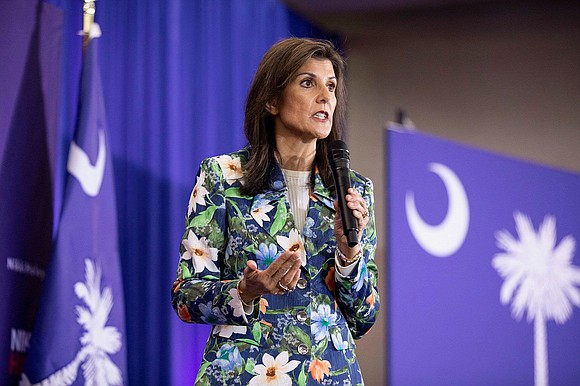Haley sides with Alabama Supreme Court on IVF ruling: ‘Embryos, to me, are babies’
Ebony Davis, CNN | 2/22/2024, 9:28 a.m.

Republican presidential candidate Nikki Haley on Wednesday sided with the Alabama Supreme Court ruling that frozen embryos are children and those who destroy them can be held liable for wrongful death.
“I mean, I think embryos, to me, are babies,” Haley said during a pull aside interview with NBC News as she described that she used artificial insemination to have her son, a different process than in vitro fertilization (IVF).
“I had artificial insemination. That’s how I had my son. So, when you look at, one thing is to save sperm or to save eggs. But when you talk about an embryo, you are talking about, to me, that’s a life. So, I do see where that’s coming from when they talk about that,” she added.
Haley later Wednesday attempted to clarify those remarks but reiterated her stance that she believes an embryo is “an unborn baby.”
“I didn’t say that I agreed with the Alabama ruling. What the question that I was asked is, ‘Do I believe an embryo is a baby?’ I do think that if you look in the definition an embryo is considered an unborn baby,” she said in an interview on CNN’s “King Charles.”
Haley then argued that the case should be viewed as a fight for parental rights and “nothing more than that” – despite the ruling raising the question of when life begins.
The court’s decision puts back into national focus the question of when life begins, one that reproductive rights advocates say could have a chilling effect on infertility treatments and the hundreds of Alabamians who seek them each year. The University of Alabama at Birmingham health system said Wednesday that it is pausing IVF treatment following the ruling. And one religious group is already using the Alabama ruling as precedent in a Florida abortion rights case, signaling the impact this ruling can have on the national abortion landscape following the reversal of Roe v. Wade.
While the unprecedented ruling does not prohibit IVF, it’s the first known case in which a US court said frozen embryos are human beings. Critics warn that the decision could make fertility treatment prices prohibitive for many families and could discourage medical providers from performing infertility treatments.
Asked earlier in the day whether she’s concerned how that could hurt people who are seeking IVF treatment, Haley called it an “incredibly personal issue,” adding, “This is one where we need to be incredibly respectful and sensitive about it.”
“Every woman needs to know, with her partner, what she’s looking at. And then when you look at that, then you make the decision that’s best for your family,” she said.
Haley, who labels herself as “unapologetically pro-life,” has often emphasized on the campaign trail that she believes Republicans and Democrats need to find a consensus on reproductive issues, specifically on abortion rights, such as banning later abortions and agreeing not to jail women who get them.
She has attempted to court moderates with her abortion stance and made it clear on the campaign trail that the abortion restrictions passed in Republican-led states would not work federally. She has also steered clear of specifying what kind of national ban she would support, but said in November that if she were governor of South Carolina and a six-week abortion ban reached her desk, she would sign the legislation into law.
During her time as governor of the Palmetto State, Haley signed a law banning abortion at 20 weeks.
This story has been updated with additional reporting.
CNN’s Christina Maxouris, Veronica Stracqualursi, Kate Sullivan and Kylie Atwood contributed to this report.



